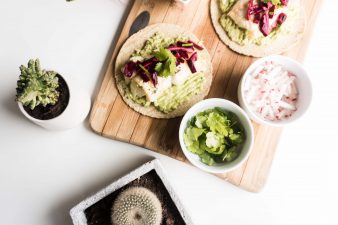 Tasty, high-protein and low-cholesterol, camel meat even has the approval of the Australian Heart Association.
Tasty, high-protein and low-cholesterol, camel meat even has the approval of the Australian Heart Association.
Sustainability in the kitchen is our creed, and camel is a far more sustainable meat than beef (which the world was horrified to discover may be contaminated with horse meat). We have posted about camel milk and its health benefits. And where camels are as much a part of the landscape as native trees, people know how tender and tasty camel flesh is.
Looking further into camel as food, we discovered Café Clock, a blog authored by Mike Richardson, proprietor of a famous eatery in Fez by the same name. The Café Clock eatery flips hundreds of camel burgers every day. According to Richardson,
“One camel will produce on average, 150 to 200 kilos of kefta (minced meat). As our burgers are around 180 grams, that works out at 1000 burgers per camel.”
Considering that camels need less feeding and produce so much meat, it makes economic and sustainable sense for Westerners to get used to eating camel. In Morocco and Australia, it’s as acceptable as any other meat – and far easier to get than, say, locusts.
Richardson and his chef shared the secrets of their delicious camel burger with cookbook author Tara Stevens. She has written a well-received cook book, Clock Book, with traditional and modernized Moroccan recipes. The rose petals in the meat mix are said to be aphrodisiac…but we think that the hash fudge recipe would probably do the trick better.
Camel is permitted in halal kitchens, but kosher-keepers must only cast their eyes over the recipe, possibly extracting the tomato sauce called Taza Ketchup to accompany kosher burgers at home.
Camel Burgers
Serves 4
Ingredients:
1 kilo – 2.2 lbs. ground camel meat
1 tablespoon fat from camel hump, or butter
4 tbsp finely chopped red onions
6 cloves of garlic, crushed
2 tbsp chopped cilantro
tbsp chopped parsley
2 tbsp chopped mint leaves
2 tbsp chopped dried culinary rose petals
2 tsp ground cumin
2 tsp red paprika
1 tsp cloves, ground
Lemon juice to taste
Salt and pepper to taste
For the Taza Ketchup:
5-6 ripe tomatoes, roughly chopped
4 tsp ground cinnamon
4 tsp honey
Olive oil
Salt and pepper
For The Burgers:Put all burger ingredients through a food processor. Pulse (don’t make it too mushy).Knead together and shape into 4 patties. Cover and chill well before cooking.Fry on a dry pan or skillet for 4 minutes both sides or to your preferred level of doneness.Serve on a toasted sesame bun with Taza ketchup and all the trimmings: a slice of cheese, tomato and onion rings.For The Ketchup:Blend the tomatoes in a processor until fairly smooth and then gently sauté in a little olive oil for 5 minutes.Add the cinnamon and honey, season and simmer until the sauce is thick and glossy (about 10 minutes).
Enjoy!
More on camel meat and milk from Green Prophet:
Camel Meat Catches On In Canada
Camels For Milk And Who’s Buying
Image of camel burger by Julius Honnor, from Clock Book by Tara Stevens.




All living beings consume other living things – even microbes do. Camel, horse, locusts, offal – if these proteins are permitted and available to hungry people, then isn’t it all to the good?
I think the reason why G-d didn’t make the camel kosher for Jews is that this noble beast was destined to be suited for higher purposes than for food.